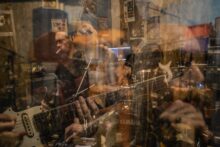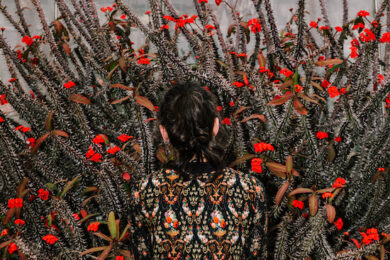Photo by Renato Cruz Santos
Toquei no Sol, the title of Marlene Ribeiro’s first album under her own name, translates from the Portuguese as ‘I Touched The Sun’. This is entirely representative of the songs it contains, which are so sun-baked they could have been laid out to dry on a crab-strewn Algarve beach in the heat of a July afternoon. The singer and songwriter makes music that is exceptionally psychedelic, folky in its reflection of time and place, otherworldly in its dreaminess. At times it is even reminiscent of My Bloody Valentine.
Taken on its own terms, Ribeiro’s music makes perfect sense. The songs on this album sound as though they come from within, a deep expression of something that has always been there, in her soul, feeding everything that she has done. Yet on the surface they sound very different and nothing like the music she is known for. Ribeiro is a member of GNOD and, as such, implicated in some of the heaviest music to come out of these islands in recent years.
She is also an experimenter and a collaborator, releasing music as Negra Branca and working with the likes of Faust, Charles Hayward and Thurston Moore. Most recently she released an album called Due Matte (‘Two Crazy Women’) with everyone’s favourite percussionist, Valentina Magaletti. It voyaged through different territories to the landscapes of GNOD, using chants and percussion created with found objects and electronics to weave the rituals of a civilisation that may, or may not, have been our own. Ribeiro’s releases as Negra Branca lead with her haunted voice, with the track ‘Nao Perdio Nada’ for example almost a religious chant, aching and impossibly far away.
Ribeiro’s catalogue has set the scene for an album that sounds like her, and not much else. There are seven tracks on Toquei no Sol, three of which are over seven minutes long. The opener, ‘Quatro Palavras’ (‘Four Words’), begins with distant chatter in Portuguese and then an older voice singing unaccompanied. This is Ribeiro’s grandmother Emilia, and the track was recorded in her kitchen at home in Portugal. Ribeiro says that she discovered Emilia had been a singer in her younger days and was offered studio time, but turned it down because of the social implications for a woman in a conservative country. Ribeiro has her singing on this track as a way to restore her suppressed voice. The track itself is a completely absorbing, atmospheric delight, gradually cycling through phases to reach a point where Ribeiro herself sings a low-key melody with guitar and oboe that comes to us across a domestic space sharing the mix with incidental background noise.
This combination of location and music runs throughout Toquei no Sol, which also includes tracks recorded in Madeira, Ireland, Wales and Salford. ‘Sangue da Lua da Loba’ (‘Blood of the Wolf Moon’) is an instrumental track. It has melancholy, meandering reeds and percussion that sounds like people walking in a hard-floored chemistry lab, hurrying footsteps, clinking flasks, the occasional liquid sounds. A saxophone repeats a desolate figure, while another chugs mournfully alongside. It was recorded in Ireland, in what was then Ribeiro’s garden, using objects found there. The track delivers a strong sense of place and of something that is happening right now. We may not be sure what it is, but we know exactly what it feels like: an insistent dream that means nothing and everything all at the same time. On ‘Forever’, the accompaniment comes from her Salford kitchen where it was recorded, pots and pans used to create a rhythm section whose domestic tones are balanced against the most expansive, drifting vocals on the album. Ribeiro sounds like Hope Sandoval broadcasting from a parallel time stream where everything is happening at quarter speed.
The title track has an off-kilter bossa nova rhythm over a rattling sonic backdrop that sounds like a ceremony recreated with whatever lies to hand: tin cans, bracelets, shells, clock chimes, chickens, anything that is capable of resonating. Ribeiro’s voice combines singing with incantation, sounding both far off and right here, in our heads, humming just behind the temples. Despite the tripped out atmosphere it feels like intentional music, rituals to make change and alter perception for good.
As well as multi-layered sonics, Ribeiro is able to call on naggingly agreeable melodies, such as that in ‘You Do It’ which would sit happily on an album by Bas Jan or The Orielles. Over a delightful woodwind line she sings, repeatedly, “Get away from me”, or possibly “You’re the way for me”, or both. Meanings advance and retreat through hazy, phasey sound. On ‘What Is It’, hand drum rhythms set up the ceremony and Ribeiro’s vocals create a wash of sound that connects this music back to GNOD and My Bloody Valentine. Ostensibly entirely different genres, they are linked by the same totality of sound that fills every space in the listener’s head and, by doing so, frees it up to enable fresh thought.
Toquei no Sol is an album made with ambition and total confidence. It speaks to a tough decade, in which the mental stability of many has grown fragile. Ribeiro’s music comes from within and inhabits the echoing spaces of the mind, infiltrating a sophisticated and all-encompassing soundscape that cleanses. She takes the sounds around us which we filter out almost all the time, and repurposes them to present our reality back to ourselves as truth. It is a deceptively simple record which needs repeated listening to uncover its subtle power. The ritual works: Ribeiro has what we need.




